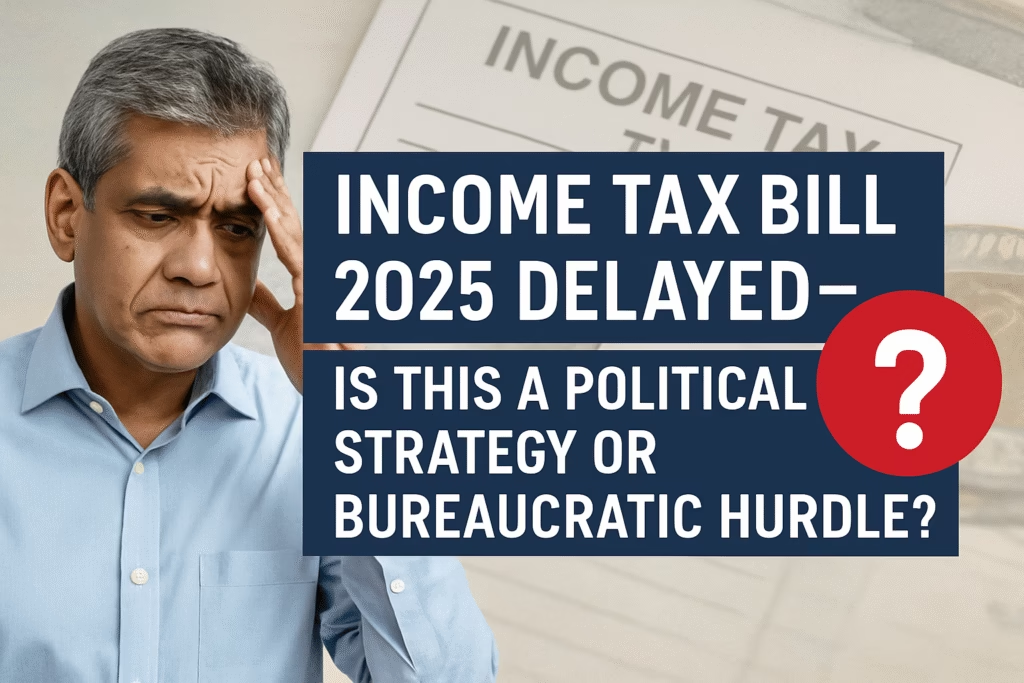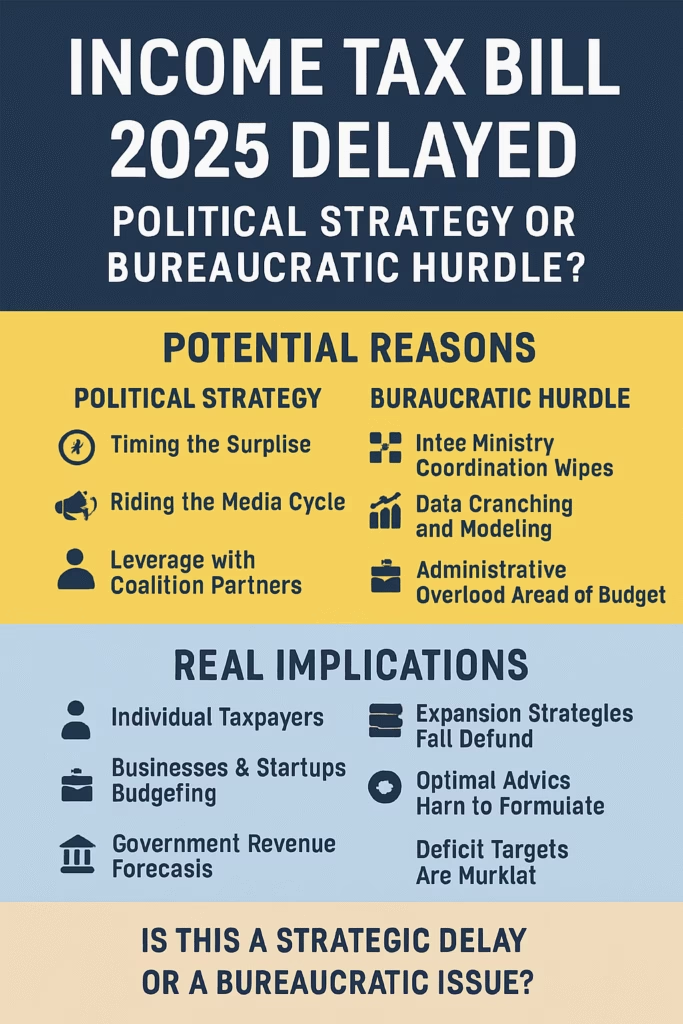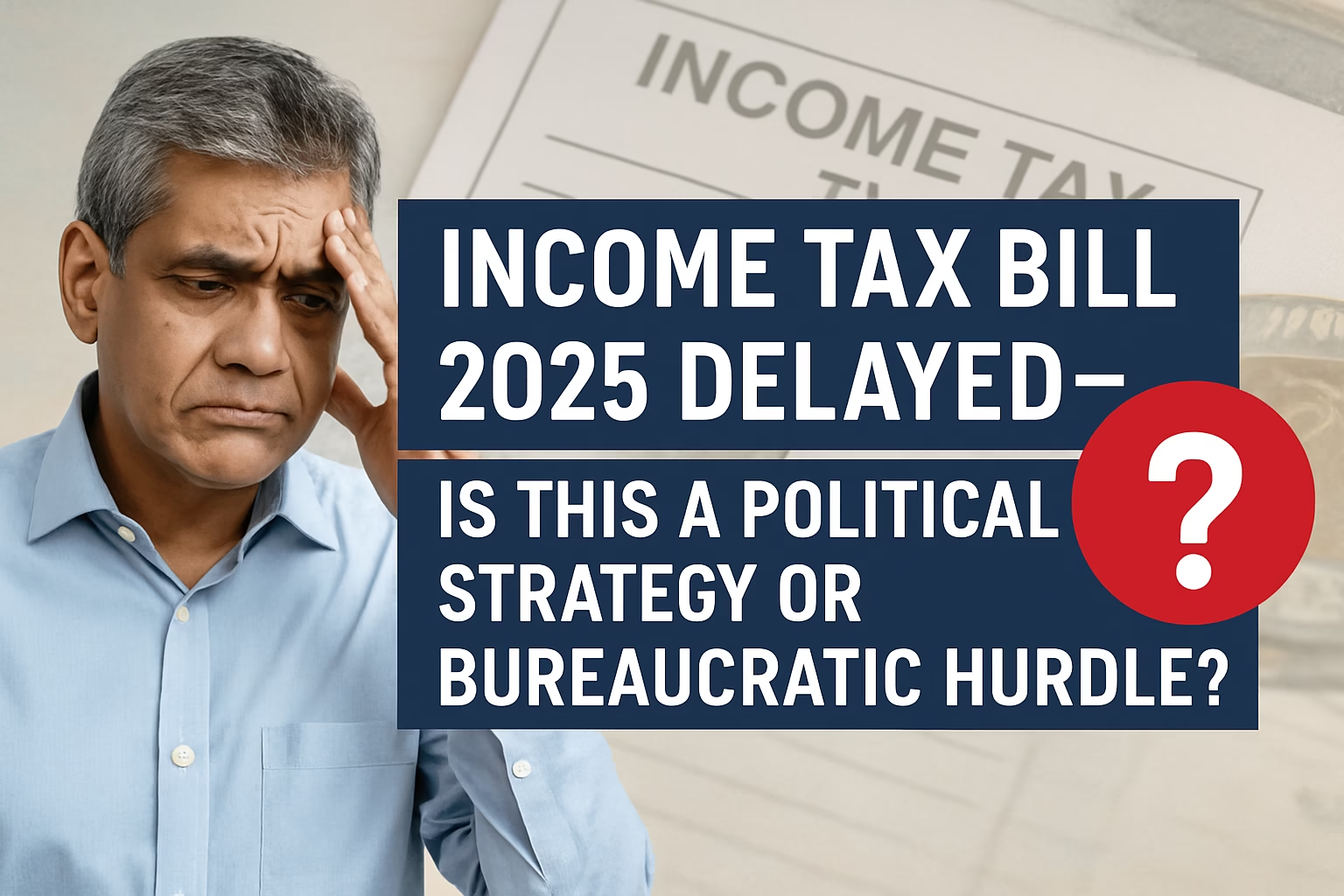Introduction
The Income Tax Bill 2025 is delayed—and it’s causing a stir. While taxpayers and businesses hold their breath for clarity on new policies, the bill meant to bring sweeping reforms seems to be stuck in limbo. Is this a calculated political strategy or simply a case of bureaucratic inertia? This article unpacks the possible reasons behind the delay, explores its implications, and suggests how stakeholders can stay informed and prepared.

What’s at Stake with the Income Tax Bill 2025?
India’s income tax landscape rarely attracts attention until the budget approaches. However, the Income Tax Bill 2025 promised several notable changes: potential tweaks to tax slabs, possible exemptions for emerging sectors like EV manufacturing, incentives for small and medium enterprises, and perhaps a more streamlined compliance regime.
Taxpayers across India—especially salaried individuals, self-employed professionals, and businesses—were looking forward to early clarity. Unfortunately, as of mid-2025, the bill remains under wraps, delivering uncertainty instead of assurance.
Is It a Political Strategy?
1. Timing the Surprise
Delaying high-impact legislation like the Income Tax Bill 2025 can be a strategic tool. Announcing significant concessions—perhaps a minor tax cut or new threshold—closer to the budget could make them feel more immediate and impactful to voters.
2. Riding the Media Cycle
In an election year, policy announcements purposely timed can dominate headlines during key campaign phases. Holding back details on tax relief or benefits keeps attention razor-focused when stakes are highest.
3. Political Leverage with Coalition Partners
If the ruling party relies on coalition support, major fiscal announcements like this could be leveraged to negotiate alliances or terms—postponing clarity until inter-party agreements are secured.
Or Just Bureaucratic Glitches?
1. Inter-Ministry Coordination Woes
Drafting a bill that touches so many sectors requires input from the finance, law, commerce, and even transport ministries. Delays could stem simply from aligning these multidisciplinary perspectives.
2. Data Crunching and Modeling
Updating tax slabs or exemptions demands robust economic modeling—impact analysis on GDP, deficit projections, and revenue estimations. Delays in compiling and vetting this data can stall the process.
3. Administrative Overload Ahead of the Budget
With multiple reform bills, sectoral budgets, and regulatory advisories needing Ministry of Finance attention, the Income Tax Bill 2025 might just be stuck in the queue.
Real Implications of the Delay
Let’s break down who feels the heat the most:
| Stakeholder | Impact |
|---|---|
| Individual Taxpayers | Budgeting becomes difficult—especially when planning investments or expenses. |
| Businesses & Startups | Hiring projections, cash flow planning, and expansion strategies hinge on future taxation clarity. |
| Financial Planners | Without policy certainty, optimal investment advice, tax-saving schemes, and compliance strategies are harder to formulate. |
| Government Revenue Forecasts | Analysts and fiscal departments work without crucial inputs, making deficit targets murkier. |
The uncertainty can stifle economic activity—delaying consumer purchases, business expansions, and tax-saving investments.

What We Know So Far
Despite the wait, there are some giveaways:
- Parliamentary Timelines: If the bill is to be tabled ahead of the summer session, internal approvals must be wrapping up. But as of now, there’s no clear timeline—raising eyebrows.
- Unclear Signals from Finance Ministry: Official updates have focused mostly on broader budget themes, not specific tax legislation. This silence further deepens the speculation.
- Pressure Mounting from Industry Bodies: Chambers like CII and FICCI are reportedly urging clarity, particularly around MSME incentives and startup-friendly tax structures—but no response yet.
Expert Voices (Hypothetical Inputs)
“Delaying key tax reforms may give short-term advantages politically, but it could backfire by squeezing economic planning timelines,” says a fiscal policy analyst.
Another voice: “From my work with businesses, the lack of clarity is forcing companies to adopt conservative hiring and investment plans, which undermines economic momentum.”
Why Aadhaar Face Authentication Fails in 2025— Real Fixes for Mobile Users
What’s Next? Policy Horizons to Watch
- Pre-Budget Whitepaper or Supplementary Circular
The Finance Ministry may release a skeleton outline soon—something to soften the delay’s blow before the full bill arrives. - Clarity on Tax Structure Earlier
Even partial details—like slab adjustments or threshold hikes—could inspire confidence. - Stakeholder Consultations Going Public
If forums or hearings on the bill begin showing up, that’s a positive signal that the legislative clock is ticking.
How You Can Stay Ahead
- Stay plugged into official channels like the Ministry of Finance website, PIB releases, and credible financial dailies.
- Create scenario plans with your accountant or financial advisor—best, moderate, and worst case.
- Keep your investments and IRAs flexible—hold decision-making until there’s enough policy clarity.
- Engage via industry forums if you represent a business body—voices matter in shaping the outcome.
Conclusion: Delay or Strategy, Time Will Tell
The Income Tax Bill 2025 The delayed headline now sparks more questions than answers. Whether this delay is a savvy political move or an administrative roadblock, the opacity is costly—for policymakers, businesses, and citizens alike. But by staying informed, adaptable, and vigilant, stakeholders can mitigate the uncertainty—even thrive when the bill finally lands.
FOLLOW TIME OF HINDUSTAN ON FACEBOOK


Your article helped me a lot, is there any more related content? Thanks!